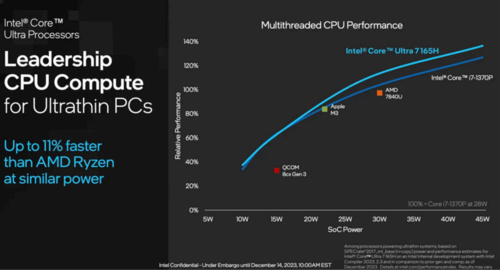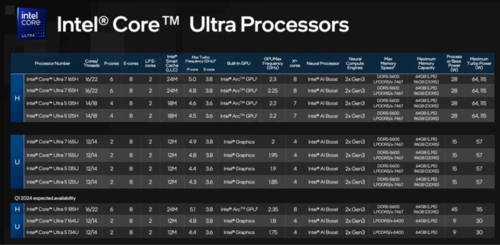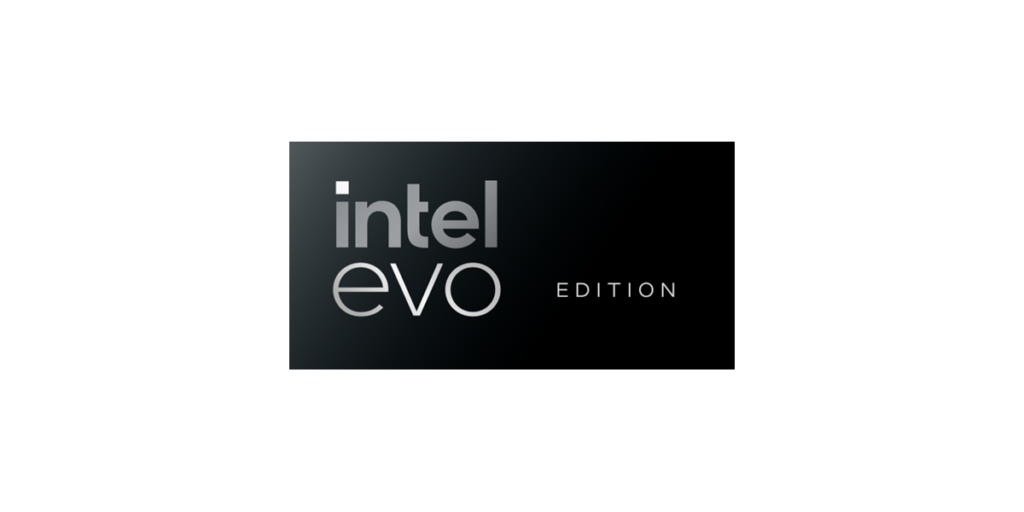Back in June, Intel announced a broad vision for its Core Ultra processors. Now, it has gotten into the specifics of its laptop chips in the range, with some devices launching featuring the new Meteor Lake technology. Here’s the full lowdown.
When Intel first announced Core Ultra, much of the focus was on the new naming convention, rather than what the underlying technology could mean. We’ve now reviewed one of the new laptops featuring an Intel Core Ultra 7 155H chip, the Asus Zenbook 14 OLED, and were mightily impressed.
But, what actually is Intel Core Ultra and the new AI-flavoured technology onboard? This is our guide to the new range and all its shiny new processors.
What is Intel Core Ultra?
Core Ultra is the new name for premium processors from Intel. The new lineup will start with Intel’s Meteor Lake chips which, for thin-and-light laptops, will be part of the 14th Gen, but desktop and high-end gaming laptops won’t feature Core Ultra tech until 15th Gen Arrow Lake chips.
These Meteor Lake chips aim to supply a leap in the efficiency offered by Intel’s processors, with a 25% reduction in power touted between the Core Ultra 7 165H and its Core i7-1370P predecessor. Intel is also touting the addition of a neural processing unit (NPU) to these new chips, aiming to supply low-power uphold for AI tasks, such as the Windows Studio Effects for video conferencing that launched in 2023.


Some of the announced devices featuring a new Core Ultra chip include an Asus Zenbook 14 OLED, Acer Swift Go 14 OLED, Acer Predator Triton Neo 16, MSI Prestige 16, Lenovo IdeaPad Pro 5i and many more. You’ll have to expect for devices, admire the Triton Neo 16, with the flagship Intel Core Ultra 185H chip though, which is set to launch in March 2024.

Apple Music
Apple Music gives you access to over 100 million songs and 30,000 playlists, ad-free. Listen online or off, across all your devices, and hear sound all around in Spatial Audio with dynamic head tracking. You can now try 1 month for free!
- Apple
- Get 1 month free
- £10.99 p/m
A key part of the introduction of the new range is an adjustment in naming. You’ll see i5/i7/i9 replacing with 5/7/9 branding as seen in the aforementioned example. Intel Core chips will ditch i3/i5/i7 for 3/5/7. Intel says that U/P/H-series branding will remain. As such, it remains unclear what the key differences will be between Intel Core and Intel Core Ultra chips, with Intel currently only stating that Core Ultra represents a “premium” brand and Core is a “mainstream” brand.
Along with the removal of the “i” branding, the generation will no longer feature at the start of the name. Instead of the 14th Gen Intel Core i9 14900H, as we would’ve expected to see with the 14th generation Meteor Lake chips if the branding had remained the same. With the mobile chips now revealed, you’ll see the likes of Intel Core Ultra 9 185H, Intel Core Ultra 7 165H, Intel Core Ultra 5 135H, Intel Core Ultra 7 165U and more available on laptops.


We know that the P-branding, used in recent years to denote a halfway house between the U-series and H-series is going away. A broader range of H-series chips now fill this gap, with U-series chips still sitting underneath.
According to Intel, this new branding is “beginning at the launch of Intel Core Ultra processor to highlight a significant shift in architecture and design”. Caitlin Anderson, Intel vice president and general manager of Client Computing Group Sales, says Meteor Lake is, “focused on power efficiency and AI at scale”. To that end, these will be the first consumer chips from Intel to feature its dedicated AI engine, Intel AI Boost.
Intel Core Ultra
Intel Core
Intel processor and Intel graphics
Meteor Lake is the first series of chips that are manufactured on the Intel 4 process node – another confusing bit of branding from Intel that obscures the nanometer process of its processors. Intel 4 equates to a 7nm process. A lower nanometer processor typically represents a significant boost in power and efficiency, but we’ll assess this for Intel Core Ultra when we get around to testing one of these chips ourselves.


With this changing of naming scheme, Intel is also updating its Evo branding. Devices that live up to the required “Evo” standards will now be referred to as “Intel Evo Edition” laptops, rather than simply donning an “Intel Evo” logo.

